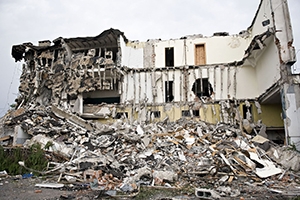Research
New Study: Small Crimes Matter Big in the War On Terrorism

A recent study published in the journal Deviant Behavior shows that outreach targeting people involved in extremist movements may reduce terrorism by simply outlining the benefits of avoiding terrorist behavior.
The new findings, co-authored by School of Public Affairs professorial lecturer, Brad Bartholomew, illustrate the importance for law enforcement to focus on all types of criminal acts committed by extremist groups, not only acts of terrorism.
“We know from previous research that terrorists are not susceptible to severe countermeasures,” said Bartholomew. “Our research finds that deterrence is more contingent on other influences that affect the moral judgement of an extremist.”
Bartholomew and co-author Jennifer Varriale Carson, an associate professor at the University of Central Missouri, expanded on prior research findings that showed terrorists are not always responsive to severe countermeasures. Though researchers have only just begun to understand the role of moral context, previous evidence has shown that acts of terrorism that are well-publicized -- especially brutal, catastrophic, or both -- are a factor in the decline of terrorism elsewhere.
Nonviolent criminal actions are common among many terrorist organizations around the world. These crimes, such as the vandalizing of a reproductive healthcare center or the release of animals used for medical research often incur substantial costs – financially and otherwise -- for extremist individuals and organizations. By focusing on these lesser crimes, officials may better understand how to prevent them. Bartholomew and Carson found that increasing patterns of lesser crimes may actually signal future terrorist attacks.
Bartholomew earned master’s and doctoral degrees in criminology and criminal justice from the University of Maryland. His research interests, in addition to terrorism, include community policing and its impact on crime and the fear of crime, gang-related crime, and crime on the college campus.
For more information on Bartholomew or SPA’s work on the criminology of terrorism, please visit our website.
